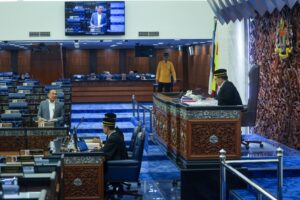KUALA LUMPUR, Nov 4 — Minister of Investment, Trade and Industry Datuk Seri Tengku Zafrul Abdul Aziz has defended Malaysia’s Agreement on Reciprocal Trade (ART) with the United States, saying it was crucial to protect jobs, businesses and investments in the country.
In an online video, Tengku Zafrul said the agreement was necessary to ensure that the current 19 per cent tariff, among the lowest in the region, would remain in place.
He warned that without the ART, US tariffs on Malaysian goods could have reverted to 25 per cent, threatening local employment and economic stability.
The minister also addressed comments by Pandan MP Datuk Seri Rafizi Ramli, who criticised the agreement as being coercive rather than mutually beneficial.
Tengku Zafrul said both he and Rafizi shared the same goal of safeguarding Malaysia’s trade interests, differing only on specific interpretations, such as the comparison to Cambodia’s deal with the US.
“I agree that there is a difference, in which Cambodia receives preferential treatment due to its status as a less developed nation,” he said.
He likened Cambodia’s advantage to affirmative action in scholarships, where children from poorer families are given priority over those from wealthier backgrounds.
Tengku Zafrul also dismissed concerns about the absence of the word “sovereignty” in Malaysia’s agreement, stressing that national safeguards remain intact.
“Although Article 5.1 does not contain the word ‘sovereignty’, but the phrasing proves that Malaysia’s sovereignty remains protected,” he said, adding that the agreement does not compel Malaysia to act solely in the interest of the US.
He explained that the relevant clause would only apply to issues of “shared” national and security interests between both countries.
In his podcast, Rafizi had described the ART as an atypical arrangement that leaned more towards coercion due to the implied threat of higher US tariffs.
He argued that the deal raised more serious concerns than just tariff levels, particularly in comparison with Cambodia’s agreement, which explicitly states that it “cannot violate national sovereignty.”
“The government’s counterargument about the presence of an ‘exit clause’ is insufficient,” Rafizi said, adding that damage to Malaysia’s position would already be done by the time such a clause was invoked.
The ART was signed on Oct 26 during US President Donald Trump‘s visit here for the Asean Summit.
The agreement aims to stabilise trade relations, protect Malaysian exports and jobs, and ensure fair treatment by promoting reciprocal tariffs, market access and adherence to trade rules between both countries.
Under the deal, Malaysia has committed to providing preferential market access to US industrial and agricultural goods, addressing non-tariff barriers, upholding environmental and labour standards, and boosting digital trade and investment protections.





